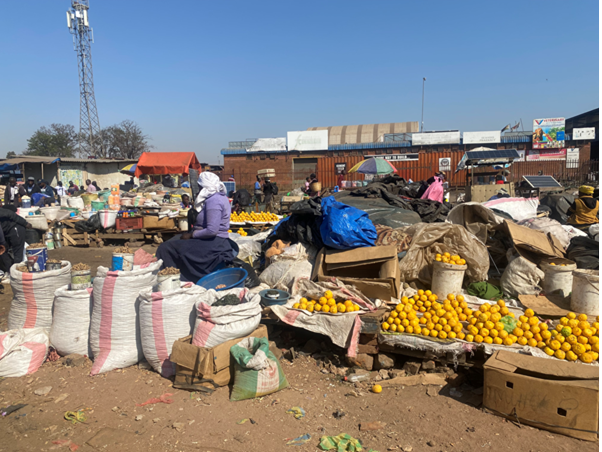The way agricultural commodities and natural food products move through African territorial markets demonstrate how food distribution is largely driven by undocumented knowledge and distribution systems. Key questions include: How do territorial markets reach a price when there is no business analyst? How do they use marketing strategies like discounts without a credit controller? Why are African territorial markets good at aggregating and distributing indigenous food? Answering the above questions can reveal the extent to which African territorial markets are becoming more resilient to climate-related shocks than other types of markets.

Reimagining resilience and food distribution
Unless you visit the nearest territorial market, you would think the consumption of indigenous food is declining due to a fast-food culture. On the contrary indigenous food is gaining more ground in African cities. Without any promotional support like advertisements, indigenous fruits are exploring markets and opening new markets in cities. More importantly, territorial markets are quietly distributing some indigenous fruits and tubers to communities where they do not grow naturally. Studying how territorial markets move and distribute food can open investors’ eyes to the value of adopting and strengthening existing food distribution systems that anchor indigenous food systems. Rather than getting into a community and trying to build local resilience by picking one or two value chains like goats and small grains, development agencies and government programs should first conduct enough exploration to see if that is what the community wants. They may discover a lot of undocumented systems that have made the status quo what it is. Many African communities still value their own food distribution systems such that what might just be needed is developing markets for economic benefits rather than introducing a goat pass-on schemes as if communities don’t have cultural systems and passing on culture within families.
Exploring local food systems and distribution pathways can also lead to creative packaging of local knowledge toward building consciousness of what makes an indigenous food system. Some of the critical question from the exploration can include: How strong are culture and spirit media in relation to local food systems? Why is advocacy silent on the importance of traditional knowledge like rain making ceremonies? How do African policy makers view spirit media? What is the view of policy makers about the dilution of traditional leadership by partisan politics which has seen some traditional leaders forsaking their cultural and spiritual roles as guardians of natural resources? With enough documentation, these issues can be tackled at community level where the loss of food systems, identity and cultural values may not be expressed in figures or dollars and cents.
Challenging industrial food worldviews
By distributing indigenous food, African territorial markets are playing a very important role in challenging proponents of industrial food systems who still question whether indigenous food systems can feed African nations. Figures being thrown around in favour of industrial agriculture are creating the impression that indigenous food systems do not exist yet they exist abundantly but what only lacks are documentation and visibility. Through silent food production and distribution practices, territorial markets are showing that if indigenous food receives commensurate support, it can indeed food African nations.
Building consciousness about the importance of indigenous food systems among local communities can create a strong foundation for reversing the negative stigmas and stereotypes around indigenous food. In some communities like Hurungwe district of Zimbabwe, pearl millet has been deliberately associated with with-craft in order to discourage production and consumption in favour of maize. Communities know what is good and bad with no need to be trained. Many food systems interventions are brought into communities as projects yet communities live a seamless life. Projects from outside come with names of funders and implementers, undermining a sense of community ownership which would ensure what is coming from outside adds value to what already exists.
Benefits of giving value to indigenous food
Based on how communities produce and distribute food through territorial markets, communities should be empowered to select what is good for them. When that happens, they can even prohibit companies that try to promote industrial inputs in the community. It is also through empowerment that communities can become competitive on the economic front and show they are able produce surplus for economic benefit. Policy makers should support natural economic drivers in each community. This should be followed by promoting fair trade. A government institution mandated to buy commodities from farmers should not offer a price lower than what is offered by the next-door farmer. African governments cannot claim to support food sovereignty when they offer uncompetitive prices for indigenous food. Giving economic value to indigenous food will ensure the Gross Domestic Product (GDP) is not only about cash crops like cocoa, cotton and tobacco or maize and wheat but also show the world the value of natural products coming through indigenous food systems. Funding for food systems should be designed in ways that foster community resilience.
The impact of siloed funding that comes through development organizations in a fragmented manner is difficult to assess and also difficult for farmers to make sense whether they are going forward or going backward. At times it is not about promoting physical production of commodities but supporting local systems by funding traditional leaders like chiefs, headmen and village heads so that they lead in revitalizing indigenous food systems. With enough support, these leaders can advocate for the strengthening of territorial markets and local food distribution systems. They can also ask government officials like ministers what they are doing to support indigenous food systems, culture, tradition and protect natural resources the way cash crops like cocoa and tobacco are supported as well as mining which receives a lot of government support.
Charles@knowledgetransafrica.com / charles@emkambo.co.zw /
Website: www.emkambo.co.zw / www.knowledgetransafrica.com
Mobile: 0772 137 717/ 0774 430 309/ 0712 737 430
